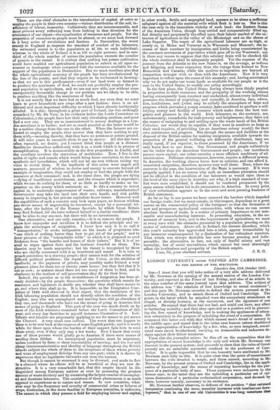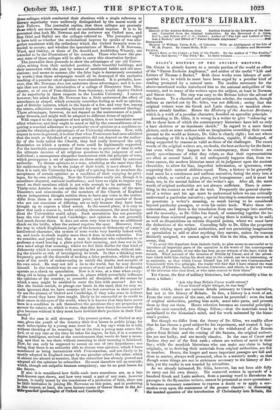LONDON UNIVERSITY versus OXFORD AND CAMBRIDGE.
TO THE EDITOR OF THE SPECTATOR.
Lincoln's Inn, 19th 1.-ktober 1897.
SIR-I trust that you will take notice of a very able address delivered by Mr. Newman at the opening of the annual session of the London Uni- versity, and reported in the Times of last Friday, and also of an article in the same number of the same journal upon that address. The subject of the address was "the relations of free knowledge to moral sentiment "; and this gave Mr. Newman occasion to defend the system pursued at the London University, and to attack those of Oxford and Cambridge. The points in the latter which he attacked were the compulsory attendance at chapel, at divinity lectures, at the sacrament, and the signature of test articles. He argued that these had not had, and could not have, any effect in furthering morality; and that they operated as a positive evil in prevent- ing the free spread of knowledge, and in making the appliances of educa- tion subservient to the purpose of upholding the creed of a corporation. He compared this latter evil with that which caused men's dread of sorcery in the middle ages; and stated that in the latter case human nature shuddered at the appropriation of knowledge by a few, who, as men imagined, consti- tuted some secret brotherhood, carrying on treasonable and unknown de- signs against their fellow creatures. Upon this the journalist seizes: he flies off on the supposition that the appropriation of secret knowledge is the only evil which Mr. Newman can discover in the present system; and proceeds to show that the rules of Greek prosody are no cabalistic mysteries confined to the professors of Cam- bridge. It is quite impossible that he can honestly have attributed to Mr. Newman such folly as this. It is quite clear that the point of resemblance between the evils dreaded in magic, and those caused, according to Mr. Newman, by the present system of Oxford and Cambridge, lies in the appli- cation of knowledge, and the means of imparting knowledge for the pur- poses of a particular body of men. Those purposes were unknown in the- former case; in the latter they are the upholding a particular set of opi- nions distinctive of a particular ecclesiastical corporation, and deemed by them, however untruly, necessary to its existence. Mr. Newman further observes, in defence of the position "that outward temptation continuing the same, morality increases with intellectual deve- lopment," that in one of our old Universities it was long notorious that
those colleges which conducted their elections with a single reference to literary superiority were uniformly distinguished by the moral worth of their Fellows. The journalist replies, that these colleges are precisely those which are most stamped with an ecclesiastical impress. It is to be presumed that both Mr. Newman and the reviewer are Oxford men, and that Oriel and Ballo' are the colleges referred to. The journalist ought to have told us whether the ecclesiastical impress he speaks of was alto- gether consistent with the orthodoxy which the Oxford formulae were in- tended to secure; and whether the speculations of Messrs. J. H. Newman, Ward, and Oakley, or those of Dr. Arnold and Archbishop Whately, are intended to be the illustrations of his remark. Those who know the pre- sent state of those colleges will be able to carry this observation further.
The journalist then proceeds to show the advantages of our old Univer- sities, arising from their secluded position, their beautiful buildings, and their connexion with the past by means of continued habits and old asso- ciations; and seems to assume, (for the false logic is dexterously concealed by words,) that these advantages would all be destroyed if the exclusive teaching of a peculiar set of opinions were abandoned. It is probable, how- ever, that Mr. Newman does not underrate these advantages; and it is cer- tain that not even the introduction of a college of Dissenters from Man- chester, or of one of Free-thinkers from Germany, would deprive Oxford of its superiority in these respects to the London University. I cannot, however, but admit that Mr. Newman has a little underrated the effect of attendance at chapel, which certainly nourishes feeling as well as opinion; and of divinity lectures, which in the hands of a few, and very few, among the tutors, administer something beyond dry and barren notional theology. These advantages, however' do not depend on the maintenance of a parti- cular formula, and might well be adapted to different forms of opinion. . With regard to the signature of test articles, there is no immediate moral effect whatever, and they ought to stand or fall by the reasonableness of re- quiring a nominal adherence to a particular set of opinions as a condition re- quisite for obtaining the advantages of an University education. Now, with respect to tests in general, it is clear that when Protestants had once admitted that the truth or falsehood of a proposition did not depend on the author- ity of the body called the Church, they had really destroyed the only foundation on which a system of testa could be legitimately supported. For the inevitable consequence of that step was in process of time to refer the ultimate decision of all religious questions to the judgment of each individual; a consequence altogether inconsistent with the principle of tests, which presupposes a set of opinions on these subjects settled by external authority. To dictate opinions to a man, admitting at the same time that his understanding is to be the judge of their truth, is most absurd. But then it is said, the University has a right of rzquiaing from its members the acceptance of certain opinions as a condition of their enjoying its privi- leges, for its own wellbeing. Now the Universities really are, though it is sometimes disputed, national institutions; and have no right to impose any creed on their members which is not wide enough to be national. The Thirty-nine Articles do not embody the belief of the nation: all the open Dissenters and nine-tenths of the members of the Church of England whose independent thought entitles them to have any voice in the matter, differ from them in some important point; and a great number of those who are not conscious of differing, are so only because they have been .brought up to express a blind assent. In the second place, it is easy to show that such a course is, under existing circumstances, the most inexpe- dient the Universities could adopt. Rash speculation has not generally been the vice of Oxford and Cambridge: new opinions do not generally find much favour there. It does not seem very wise to keep an additional check on the bridle, when the animal requires the spur. Moreover, from the way in which Englishmen judge of the honesty or dishonesty of a man's intellectual character, the system of tests works very harshly indeed with us, and tends to check inquiry more than it does in other countries. For we consider, and justly too, that a man is dishonest who subscribes to or professes a creed bearing a plain prima fade meaning, and does not in his own mind adopt that meaning; whilst we feel little dislike for that kind of dishonesty which is content with accepting the mere formula, without tak- ing the trouble or risk of investigating its truth. So that a thinking man frequently gets all the discredit of making a false profession, whilst he gets none of the credit of endeavouring to satisfy the doubts and scruples of Ifia own mind. He may not tell a lie to the world, but he may deceive himself. In this twofold way do our systems of tests and habits of thought 'operate as a check on speculation. Now is it wise, at a time when every- -thing old is being called in question, in places which powerfully influence the opinions of the country, to proscribe all discipline, all the means by which a man might be enabled to enter the lists with success? Are we, Ile the foolish ostrich, to plunge our heads in the sand, that we may re- main ignorant that we have enemies till we feel ourselves in their power? Or are the alumni of Oxford and Cambridge, if they take arms in defence of the creed they have been taught, likely to be successful or do credit to their cause in the eyes of the world, when it is known that they have never been in a condition to ask themselves the questions they are proposing to answer for others; or, which is worse, that they have found the answer they give because without it they must have forfeited their position in their Uni- versity?
But the case is still stronger. The present system, of Oxford at any rate, gives the youth of the country their first lesson in public lying; for such subscription by a young man must be. A boy says what he is told, without thinking of its meaning; but at the time a young man enters Ox- ford, or at any rate at the time he takes his degree, he has, if in a common degree intelligent, arrived at the consciousness that words do bear a mean- ing, and that to use them without assenting to their meaning is falsehood. Now, he can only be supposed to assent on one of two hypotheses: one being, that there is an authority able to dictate tree opinions, which I have mentioned as being inconsistent with Protestantism, and not likely to be openly adopted in England except by one peculiar school; the other, which is almost too absurd to mention, that the subscriber has already proved and 'adopted all the opinions he subscribes. He must therefore tell an untruth; Which, though not culpable because compulsory, can be no good lesson for the future.
If also it is considered how futile such tests sometimes are, as a late well-known case shows, and bow very small a part of any man, however honest, is really tested by the touchstone of a profession of faith, there can _be little hesitation in joining Mr. Newman on this point, and in preferring In this respect, at least the open lecture-rooms of Gower Street to the Ar- e:le-guarded quadrangles of Oxford and Cambridge. - F.

























 Previous page
Previous page